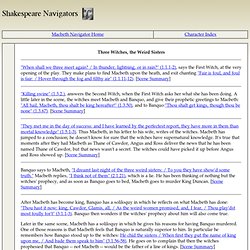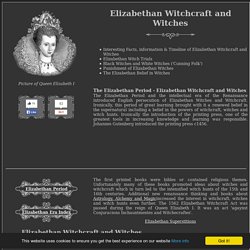

Three Witches. Characters: Three Witches, the Weird Sisters. Three Witches, the Weird Sisters "When shall we three meet again?

/ In thunder, lightning, or in rain? " (1.1.1-2), says the First Witch, at the very opening of the play. They make plans to find Macbeth upon the heath, and exit chanting "Fair is foul, and foul is fair: / Hover through the fog and filthy air" (1.1.11-12). [Scene Summary] "Killing swine" (1.3.2.), answers the Second Witch, when the First Witch asks her what she has been doing. "They met me in the day of success: and I have learned by the perfectest report, they have more in them than mortal knowledge" (1.5.1-3).
Banquo says to Macbeth, "I dreamt last night of the three weird sisters: / To you they have show'd some truth. " After Macbeth has become king, Banquo has a soliloquy in which he reflects on what Macbeth has done: "Thou hast it now: king, Cawdor, Glamis, all, / As the weird women promised, and, I fear, / Thou play'dst most foully for't" (3.1.1-3). Weird Sisters (the Witches) in Macbeth. Like Mary-Kate and Ashley Olsen twins pre-2004, the three weird sisters never appear apart, and they're always talking over and with each other—so we're going to consider them as a single unit.

And the question of the day is this: are they simply prophets? Or do they actually set the play's events in motion? Enter Three Witches When we encounter them in the play's opening scene, we're not sure where they've come from, who/what they are, or what they have in mind when they say they plan to meet Macbeth. What we do know is that they've gathered amidst thunder and lightening and move about the fog and "filthy" air, which seems just as murky and mysterious as they are. […] What are theseSo wither'd and so wild in their attire,That look not like the inhabitants o' the earth,And yet are on't? In response, weird sisters deliver the infamous lines that set the tone for the play: "Fair is foul and foul is fair" (1.1.4).
Witchcraft The Sisters and Fate Need help with College? Elizabethan Witchcraft Beliefs. Elizabethan Superstitions Who were the people accused of being Elizabethan Witches?

Women were those most often accused of being witches. There were 270 Elizabethan witch trials of 247 were women and only 23 were men. Those accused of witchcraft were generally: OldPoorUnprotectedSingle women or widows (many kept pets for company - their 'familiars') During the Elizabethan era men were all-powerful. Queen Elizabeth and the Punishment of Elizabethan WitchesThe hysteria and paranoia regarding witches which was experienced in Europe did not fully extend to England during the Elizabethan era. Elizabethan Witches - Black Witches and White Witches ('Cunning Folk' or Healers)Up to the Renaissance period the wisdom of the 'Wise women' or 'Cunning Folk' - the White Witches - were seen as helpful, if not invaluable, members of the community.
Elizabethan Superstitions Who were the people accused of being Elizabethan Witches? During the Elizabethan era men were all-powerful. Witches cauldron. Witches. Macbeth William Shakespeare Study Guide & Homework Help - Three Witches, The Weird Sisters (Character Analysis) Macbeth Macbeth (mak-BEHTH), thane of Glamis, later thane of Cawdor and king of Scotland.

A brave and successful military leader, and potentially a good and great man, he wins general admiration as well as the particular gratitude of King Duncan, his kinsman. Meeting the Three Weird Sisters, he succumbs to their tempting prophecies, but he also needs the urging of his wife to become a traitor, a murderer, and a usurper. He is gifted, or cursed, with a powerful and vivid imagination and with fiery, poetic language. Gaining power, he grows more ruthless, until finally he loses even the vestiges of humanity. Lady Macbeth Lady Macbeth, the strong-willed, persuasive, and charming wife of Macbeth.
Banquo Banquo (BAN-kwoh), Macbeth’s fellow commander. The Three Weird Sisters The Three Weird Sisters, three witches, sinister hags who seem more closely allied to the Norns or Fates than to conventional witches. Macduff Macduff (mak-DUHF), thane of Fife. Duncan.